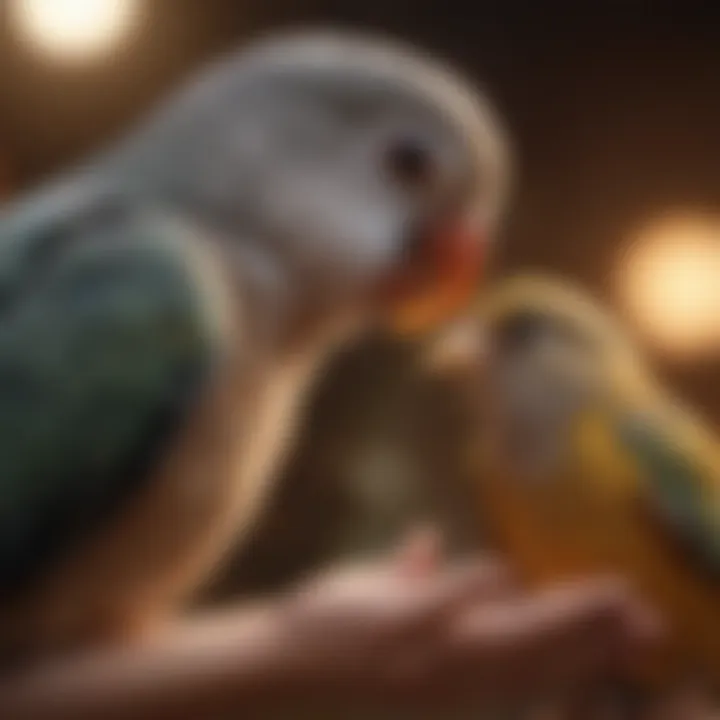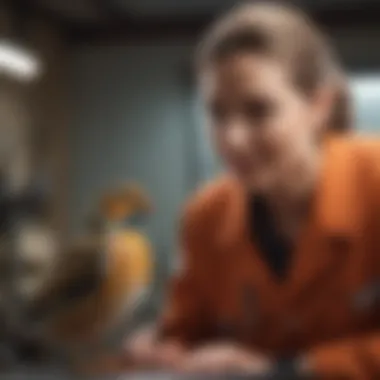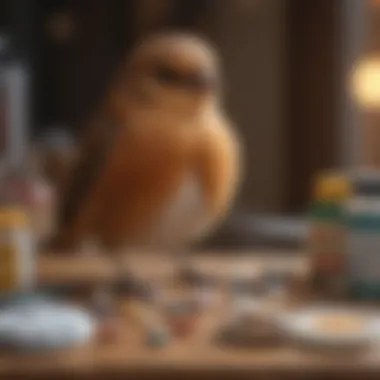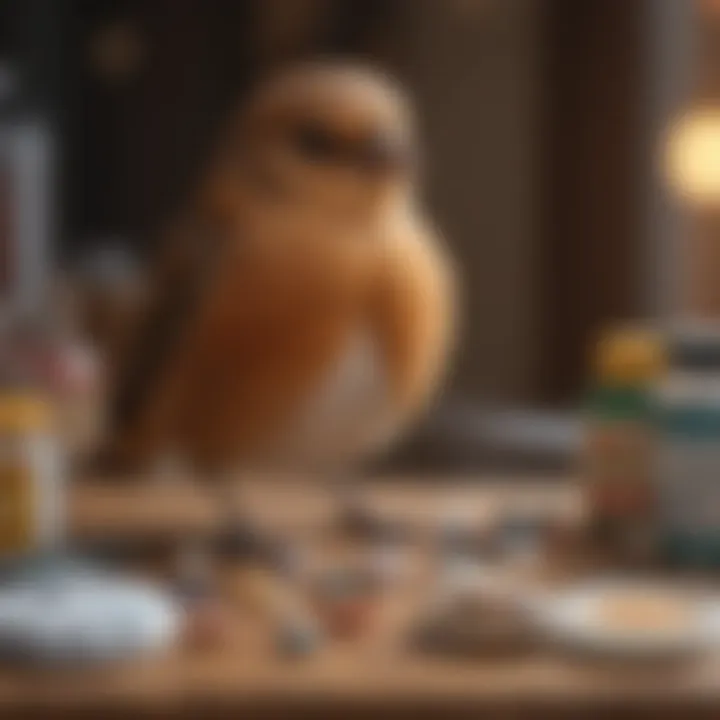Key Steps to Care for Your Ill Bird Effectively


Intro
Caring for a sick bird can feel like navigating through a dense fog without a map. The first step is to understand the unique needs of your feathered companion. The intricate world of avian health goes beyond mere physical symptoms. Just like humans, birds experience emotional highs and lows, and you need to be well-equipped to address both the visible signs and the underlying emotional distress.
Birds are fascinating creatures, and their well-being is intertwined with their environment, diet, and social interactions. They depend on us, not just for food and shelter, but for comfort and emotional support. We’ll explore the essentials that every bird owner should be aware of—ranging from the basics of avian care to deeper emotional insights.
In the upcoming sections, we’ll take a closer look at crucial areas like nutrition, habitat, and the importance of a trusting relationship with your bird. We'll also identify common health issues and what you can do to help prevent them. And perhaps just as important, we’ll delve into the energetic relationship you build with your bird, which can greatly influence its recovery.
Remember, a sick bird is a call to action. Responding correctly requires a mixture of proactive care, timely veterinary advice, and an understanding of their unique needs. Let's embark on this journey together, ensuring that your feathered friend gets the attention and care it deserves.
Understanding Avian Health
Caring for our feathered companions involves more than just meeting their basic needs; it requires a profound understanding of avian health. Birds are unique creatures with complex physiological systems that differ greatly from mammals or other pets. This article emphasizes the importance of grasping these differences, as knowledge on avian health lays a foundation for effective caregiving. An informed owner can better recognize early signs of illness, facilitating timely interventions that could make all the difference in recovery.
Given that birds can often mask their ailments, an awareness of their health can help owners make informed decisions, maintain their bird’s wellbeing, and, ultimately, enhance the quality of life for these delicate pets.
The Unique Physiology of Birds
Birds possess a variety of physiological traits that distinguish them from other creatures. They have lightweight bones, a specialized respiratory system, and a unique method of thermoregulation. Additionally, avian metabolism operates at a remarkable pace, necessitating specific dietary requirements and care considerations.
Understanding these unique traits informs owners about proper care and the implications of sickness. For example, a bird's body temperature may fluctuate much more than that of a small mammal, so knowing what is normal can be crucial if the bird shows signs of distress.
Common Signs of Illness
When a bird is unwell, it may exhibit various behavioral and physical indicators. Observing these signs can provide invaluable insight into a bird’s health status.
Behavioral Changes
Behavioral changes are often one of the first indicators that a bird might be sick. You might notice shifts in their activity level, perhaps becoming unusually lethargic or overly aggressive. A well-adjusted bird, known for singing or chirping, may suddenly become quiet, raising a red flag to owners.
Understanding these subtleties is crucial: it allows pet owners to pinpoint issues early on. A key characteristic of behavioral changes is that they can reflect both physical and emotional states. For instance, a bird in discomfort might refuse to interact, impacting not only its health but its emotional stability as well.
Key points regarding behavioral changes:
- Sudden changes can indicate illness.
- Monitor daily habits for any deviations.
Physical Symptoms
On the other hand, physical symptoms are more obvious signs of health issues. This can include changes in feather quality, such as feather plucking or dullness, as well as alterations to eating or drinking habits. Physical symptoms may also manifest as weight loss or changes in droppings, which can provide immediate clues to the severity of the condition.
Key features of physical symptoms include:
- They often signal immediate health concerns.
- Some symptoms can lead to urgent care needs if not addressed.
Recognizing both behavioral changes and physical symptoms is paramount for bird owners. By being vigilant and observant, they can play a crucial role in their pet’s health management.
Importance of Early Detection
The earlier a problem is identified, the better the chances for a successful resolution. Birds often do not show outward signs of severity until conditions become critical. Early detection empowers owners to take prompt actions, be it scheduling a vet appointment or adjusting their bird's care routine.
In summary, understanding avian health equips bird owners with the tools necessary to assess their pet's condition more accurately. This knowledge not only fosters effective care strategies but also helps cultivate a deeper bond between owner and bird. Advocating for both physical and mental well-being ensures that birds can thrive even when facing health challenges.
Initial Response to Sickness
When your bird falls ill, the very first steps you take play a crucial role in their recovery. A quick and informed response can differentiate between a minor issue that resolves quickly and a serious health concern that escalates. Understanding the signs of illness is essential, as feathery friends often hide their discomfort until it becomes severe. By being proactive and attentive right from the get-go, you can effectively manage your bird’s health.
Assessing your bird’s current condition is your best starting point. This involves examining their behavior, diet, and environment. Additionally, knowing when to involve a veterinarian is key to ensuring your pet receives appropriate medical care. The quality of veterinary care can vary widely, making it vital to find the right professional who specifically understands avian health.
In essence, taking swift action when your bird shows signs of sickness ensures that they receive the best potential care, ultimately leading to a better chance of recovery.
Assessing Your Bird's Condition
Assessing your bird’s condition involves careful observation and a structured approach to figuring out what’s amiss. It’s important to be thorough yet calm, as stress can exacerbate your bird's situation.
Health Evaluation Checklist
A well-thought-out health evaluation checklist can be immensely helpful in assessing your bird's condition. This checklist typically includes points such as:
- Behavioral changes: Look for alterations in activity, vocalization, or social interaction.
- Appetite and Drinking: Has your bird lost interest in its usual diet or water?
- Physical symptoms: Observe for changes in feathers, droppings, or posture.
This checklist is beneficial because it simplifies the process, ensuring you cover all bases. Its structured nature helps eliminate confusion during a stressful time, allowing pet owners to focus on crucial aspects of their bird’s health. However, while this checklist provides a good foundation, be aware that it doesn't replace professional veterinary advice. Also, bird owners should note that some signs may vary widely depending on species, so adapting the checklist to include species-specific symptoms can be quite advantageous.
When to Contact a Veterinarian


Knowing when to reach out to a veterinarian can be a tricky decision for many bird owners. Generally, if you notice significant behavioral changes, reduced appetite, lethargy, or any physical anomalies, don’t hesitate to consult an avian vet. Remember, the longer you wait, the bigger the problem may grow. Ignoring minor symptoms could lead to dire consequences in the long run.
Choosing the Right Veterinary Care
Selecting the right veterinary care providers for your bird is just as crucial as recognizing illness. A specialized avian vet understands the unique medical requirements that birds have, as compared to general pet practitioners. The subtle differences in treatment, medication, and even handling of birds can be astonishing.
Finding Avian Specialists
Finding avian specialists might seem daunting, but it’s essential for your bird’s health. This can greatly enhance recovery rates and quality of care. Look for veterinarians who have additional training in avian treatments, memberships in avian professional organizations, or a history of working specifically with birds. This focus makes them a beneficial choice.
A unique feature of locating avian specialists is the ability to leverage their expertise when managing your sick bird. They are more equipped to handle the peculiar medical issues that can arise in avian pets. Ultimately, their specialized knowledge ensures that you’ll receive targeted advice and treatment options.
"Being able to connect with a veterinarian who understands your bird’s needs can be the difference between health and serious trouble."
In summary, a swift, structured, and informed response to avian illness is vital to the wellbeing of your feathered companion. Be observant, trust in your instincts, and consult professionals when necessary.
Creating a Supportive Environment
Establishing a nurturing space for your sick bird is paramount. More than just a cozy corner, this environment impacts recovery levels and overall well-being. Avian health isn't solely about physical ailments; it intertwines with emotional stability, which hinges on a secure setting. When birds feel safe and at ease, they can devote their energy to healing rather than worrying.
Isolation from Other Pets
It's essential to keep your sick bird separate from other pets. Not only does this help prevent the spread of illness, but it also allows for a less stimulating environment. Birds can easily become stressed by the presence of other animals. Isolation minimizes potential conflicts and distractions. Your bird needs time to recuperate without the extra chaos that comes with a bustling household. This measure ensures that it's focused on getting better while offering you an opportunity to monitor its behavior and habits without interference.
Setting Up a Comfortable Space
Temperature Considerations
Temperature plays a crucial role in your bird’s recovery. Birds are sensitive to heat and cold, with many preferring a room temperature between 70°F to 75°F (21°C to 24°C). Maintaining this range helps maintain their metabolic rate, preventing them from using precious energy to keep warm. If it’s too chilly, your bird may become lethargic, hampering recovery. Conversely, excessive heat can lead to overheating, which is equally dangerous. Adjust the environment according to your bird's comfort, considering drafts and direct sunlight. Creating a warm, cozy spot can make a world of difference.
Minimizing Stress Factors
Stress can derail recovery efforts significantly. It’s essential to identify what might cause anxiety in your bird. Loud noises, sudden movements, or even unfamiliar smells can trigger stress. One way to minimize these factors is to ensure a calm atmosphere. Covering the cage for part of the day can provide a sense of security and limit visual stimulation. Additionally, reducing foot traffic near their space can further ensure tranquility. By doing these things, you create a reassuring environment where your bird can rest and focus on healing.
Monitoring Environmental Conditions
An ideal environment goes beyond just comfort; it requires careful monitoring. The factors of humidity and air quality directly influence your bird's health.
Humidity Levels
Humidity is often an overlooked aspect in caring for sick birds. Keeping humidity levels between 40% to 60% mimics their natural habitat and aids in preventing respiratory issues. Too high humidity can lead to mold growth while too low can dry out their respiratory systems, causing discomfort. Investing in a hygrometer can help you keep an eye on this important factor, ensuring your feathered friend stays comfortable and can breathe easily.
Air Quality
Clean air is vital for a recovering bird. Poor air quality can worsen health problems and complicate recovery. Ensure good ventilation in the room while avoiding strong-smelling cleaners, smoke, or anything that could pollute the air. An air purifier designed for small spaces may also be useful in maintaining a hygienic atmosphere. In essence, fresh air promotes better respiratory health, contributing to the overall comfort and recovery process for your bird.
"Creating a positive and safe environment is as critical as any medical intervention. It significantly aids recovery."
In sum, creating a supportive environment involves thoughtful measures targeting both physical and emotional needs. From isolating your bird to controlling air quality, each step is crucial for fostering healing and comfort.
Nutritional Requirements
Understanding the nutritional needs of your sick bird is not just crucial—it's downright fundamental for recovery and wellbeing. The right diet can bolster their immune system, help them regain strength, and fuel their body to fight off whatever ailments they might be facing. When a bird is unwell, they may not eat or drink as they normally would, which makes it all the more vital to ensure they receive adequate nutrition. This section breaks down what you need to know about feeding your feathered friend during challenging times.
Understanding Dietary Needs
Essential Nutrients
Essential nutrients serve as the building blocks to a bird’s health. These include vitamins, minerals, proteins, and fats, all playing pivotal roles in metabolic processes. For instance, vitamin A aids vision and is necessary for skin and mucous membrane health. Meanwhile, calcium is vital for strong bones and proper muscle function, especially in egg-laying females.
Bird owners should pay particular attention to offering a varied diet to cover different nutritional bases. Seed mixes alone often lack vital nutrients, leading to deficiencies over time. An ideal selection should include:
- Fresh fruits and vegetables
- Pellets specially formulated for birds
- High-quality seeds, but in moderation
The unique aspect of these essential nutrients is how they interact with a bird's physiology; their bodies are often finely tuned to require not just adequate, but appropriate levels of each nutrient for optimal functioning. Too much of one can often lead to an imbalance, so careful attention to quantity and quality can make all the difference in your bird’s recovery.
Recommended Food Types
When caring for a sick bird, the types of food you offer should prioritize digestibility and palatability. Soft, organic options like apples, carrots, or leafy greens can encourage them to eat, whereas classics like seed mixtures can be tempting yet often lack adequate nutrition.
Opting for specially formulated pellets tends to be a wise choice because they are designed to meet nearly all of a bird’s dietary needs in one convenient package. These often include key vitamins and minerals that might otherwise be overlooked in fresh foods alone. Moreover, the unique feature of these recommended food types is their ability to provide balanced nutrition while being easy for birds to consume, especially when they're feeling under the weather.
Hydration Importance


Feeding Water
Feeding water might seem simplistic, but hydration is often overlooked in bird care. Dehydration can be critically detrimental to a sick bird. It's essential to ensure they have constant access to clean, fresh water. Sometimes, they might be more inclined to drink if the water is slightly warmed or if they see you drinking near them. Adding electrolyte solutions can also provide that extra boost of hydration and fluids necessary for recovery.
One unique feature is to check if your bird shows interest in different presentation styles of water — such as incorporating ice cubes on warm days might encourage them to drink more. However, regularly cleaning water containers is crucial as well, as stale or dirty water can deter them from taking sips.
Signs of Dehydration
Recognizing the signs of dehydration is as important as ensuring they have water. Common indicators include:
- Dry beak or eyes
- Lethargy and decreased activity levels
- Loss of elasticity in skin
- Dark-colored urine or urates
Understanding these signs early on can mean the line between a simple fix and a trip to the vet. If you observe any of these signs, taking immediate action—like offering them an electrolyte solution or consulting a vet—is imperative to securing their health.
Adjusting Diet During Illness
Dietary adjustments during a bird's illness are often necessary. When birds feel unwell, their appetite can wane, making the task of getting them to eat more challenging.
- Soft foods. Consider transitioning to soft foods that are easier on their digestive systems, such as cooked grains or mashed fruits and vegetables.
- Frequent, small meals. Offering smaller, frequent meals can encourage them to nibble rather than overwhelming them.
- Supplements. Sometimes, using supplements might be warranted if your bird is unable to meet their nutritional needs through food alone.
Ultimately, being attentive to changes in their diet and adapting to their needs can guide you in providing optimal care for your pet bird as they bounce back to health. As you navigate through their dietary landscape, remember that quality and care in your choices can utilize nutrition as a powerful ally in their recovery.
Observation and Care
Caring for a sick bird is not just about ensuring it receives the right medication or food. It's crucial to constantly observe and provide care that monitors their health and emotional state. This part highlights the significance of staying attentive to your bird's needs, ensuring you pick up on subtle changes that may indicate a need for intervention. By establishing a routine in observation, pet owners can take proactive steps to promote recovery and well-being.
Daily Health Monitoring
Tracking Behavioral Patterns
Monitoring a bird's behavior daily plays a significant role in maintaining its health. Each bird has its own unique quirks and habits. Being vigilant allows you to notice when something seems off. For instance, if a parakeet usually chirps away happily but suddenly turns quiet, it might signal something amiss.
One key characteristic of tracking these behavioral patterns is the ability to establish a baseline of what is normal for your specific bird. This not only aids in detecting illness early but can also be incredibly helpful during vet visits, as it provides concrete observations to discuss. The unique feature of this practice lies in its reliance on keen, personal observation. The advantage here is that noticing behavioral shifts can lead to more timely interventions, potentially saving your bird from more serious health issues down the line.
Identifying New Symptoms
Recognizing new symptoms is essential when caring for a sick bird. As birds are notorious for hiding pain and illness until it's quite severe, being proactive is crucial. Symptoms like puffed-up feathers, changes in droppings, or unusual vocalizations can hint towards underlying conditions that require attention.
The key characteristic of identifying new symptoms is the focus on shifts from the bird's baseline behavior and health. It's beneficial because catching these changes early provides crucial information for your veterinarian and can lead to quicker resolutions. The disadvantage, however, is that it requires a certain level of experience; newcomers may struggle to interpret small changes correctly. Yet, by keeping a watchful eye and noting daily observations, even less experienced owners can enhance their understanding over time.
Administering Medication
Types of Medications
Administering medication is another critical component when caring for a sick bird. Various types of medications can be necessary, ranging from antibiotics to anti-inflammatories, and even specialized treatments like antifungals. Familiarizing yourself with these types can help you understand what is appropriate for your bird’s condition.
One notable advantage of understanding the types of medications is that it prepares caregivers for informed discussions with their veterinarian. A unique feature of this knowledge is that it empowers pet owners to be advocates for their birds, ensuring they receive the best possible care. The downside can be the potential confusion arising from different medications' specific uses and side effects, which reinforces the need for keeping close communication with your vet.
Proper Dosage Guidelines
Following proper dosage guidelines is vital to ensure that your bird receives the correct amount of medication without risking an overdose or ineffectiveness. Each medication has specific dosages based on the bird's size, age, and health condition.
A significant aspect of this practice is that it helps prevent the misuse of medications, which can lead to complications. A unique feature of adhering to proper dosage guidelines is the emphasis on accuracy — even a small error can lead you down the wrong road. The benefits here cannot be overstated, as proper administration can facilitate quicker recovery, while missteps can lead to protracted illness or complications. However, it’s equally critical to remember that nuanced instructions may sometimes differ for each bird, leading to the need for careful reading and understanding of vet prescriptions.
Providing Comfort and Reassurance
Providing comfort and reassurance is just as vital as any medicinal treatment. Birds are sensitive creatures often affected by stress and anxiety, particularly when they are unwell. Creating an environment that fosters comfort can significantly improve their mental and emotional state. Simple actions like talking softly to your bird, ensuring it has a safe space, and spending quality time with it can make a world of difference.
Once again, this part underscores how important it is to look beyond the physical care of your bird. Holistic care — incorporating emotional support — can yield better recovery outcomes. Monitoring your bird's reaction to treatments, making adjustments based on its stress levels, and offering it attention are all critical for a well-rounded care strategy.
In sum, observation and care form the backbone of effective bird ownership, particularly during illness. Your bird's silent cues can speak volumes when you're attuned to its needs.
Long-term Care Considerations
Caring for a sick bird doesn't end the moment your feathered friend seems to bounce back to his old self. In fact, the long-term care you provide post-recovery is just as crucial for ensuring your pet’s well-being and health. Consider it like nurturing a flower after a harsh winter; your bird may be looking better, but it still needs special attention to thrive in its environment.
Long-term care focuses on monitoring, adjusting care strategies, and planning follow-ups, helping you identify any signs of relapse or lingering issues. An attentive approach not only fosters a stronger bond between you and your bird but also sets the stage for better health management in the future.
Monitoring for Recurrence of Symptoms
Diligently observing your bird after recovery is paramount. It’s not as simple as saying, "Okay, she’s better now!" After illness, your pet might still harbor vulnerabilities that could manifest as symptoms down the line. It’s important to keep an eye out for:
- Changes in eating habits or water consumption.
- Behavioral shifts such as excessive preening or lethargy.
- Any unusual vocalizations, which might indicate discomfort.


Documenting these observations provides a clearer picture of your bird’s health. Consider keeping a journal. It may feel tedious, but it can make spotting patterns a lot easier over time.
"An ounce of prevention is worth a pound of cure."
Planning for Follow-up Veterinary Visits
Just as we may have periodic check-ups with our doctors, your bird may need a follow-up visit to the veterinarian. Schedule this early enough that you maintain an open line for concerns. Some birds can downplay their issues; bringing them in ensures their recovery is on the right track.
When you go to the vet:
- Bring along your observations and journal entries to discuss.
- Ask specific questions regarding signs to watch for in the future.
- Get clarity on any ongoing treatments or medications your bird may need.
Either way, you'll be empowering yourself with knowledge and ensuring that your bird remains in good health.
Adjusting Care Strategies Based on Recovery Progress
Each bird has its unique recovery journey, and adjusting care strategies based on progress is essential. Remember, the recovery phase isn't a sprint but rather a marathon. Here are specific strategies to keep in mind:
- Nutritional Adjustments: As your bird heals, it might require a boost in vitamins. Gradually shift to a nutritionally balanced diet if it’s had restrictions during illness.
- Gradual Reintroduction to Activities: If your bird was previously sociable, slowly reintegrate it to its usual environment. Sudden exposure can be overwhelming.
- Emotional Support: Pay attention to how your bird feels emotionally. Scenarios like returning to a busy household might unsettle a recovering bird, so take it slow.
By evaluating how your bird interacts with its environment and responds to care, you can fine-tune your approach and ensure that your pet not only recovers but thrives in the long run.
Understanding Your Bird's Emotional Needs
Caring for a sick bird isn't just about physical ailments; it's equally important to give attention to its emotional health. The comfort and well-being of your feathered friend rely heavily on understanding and addressing its emotional needs. Birds, like humans, experience a range of feelings and emotions. When they are sick, these emotions can intensify, which can sometimes hinder their recovery process.
A bird's emotional state can affect its willingness to eat, engage in activities, or even respond to treatment. Ensuring that your bird feels secure and cared for during illness can contribute significantly to its overall healing journey. Therefore, placing focus on how your bird feels mentally and emotionally is as vital as monitoring its symptoms and physical health.
Recognizing Stress and Anxiety Symptoms
Behavioral Cues
When observing your bird, small changes in behavior can hint at underlying anxiety or stress. For instance, if your bird that usually chirps merrily starts to isolate itself or fluffs up its feathers, these are flags that something's amiss. Key characteristic of such cues is their subtlety; they often manifest in a way that can be easily overlooked. Paying close attention to these behavioral signs is a beneficial strategy as it gives you a glimpse into your bird's emotional landscape.
(Behavioral cues may include actions like pacing, excessive preening, or even becoming aggressive). These unique features of behavioral cues can provide valuable insights when evaluating your bird's emotional health. Understanding these signs is an advantage, but it can also lead to challenges in interpretation since every bird may express distress differently.
Vocalizations
Vocalizations are another meaningful aspect to consider when assessing your bird's emotional state. A vocal bird that suddenly goes quiet might be a telltale sign of anxiety or discomfort. This transformation in vocal interaction often serves as a call for help or attention, showcasing the bond you share. The key characteristic here is that vocal variations can reflect not just distress but also joy, creating a nuanced spectrum of communication.
Notably, this unique feature of vocalizations is its potential duality; a sudden lack of chirping can indicate trouble, while excessive screeching might scream for attention. Understanding their vocal patterns can therefore become a key tool in recognizing the emotional state of your bird, though one must navigate carefully, as misinterpretations may occur without context.
Providing Social Interaction
Importance of Bonding
Bonding is essential for a bird’s emotional robustness. The strong ties they form with their human caregivers can foster a sense of security and trust. Birds are social creatures, and this social interaction significantly aids in reducing stress levels. The key characteristic of bonding here is its mutual benefit; when caregivers invest time in building relationships with their birds, it creates a stronger environment for cooperation during recovery.
The unique feature of focusing on bonding lies in how it strengthens the emotional connection between pet and owner, enabling more effective communication. While this approach can positively enhance recovery, it also requires and deserves genuine effort and patience from the caregiver.
Engaging Activities
Engaging activities are another crucial element in supporting a bird's emotional needs. Simple play routines, like swinging on a perch or exploring toys, can occupy their minds and alleviate stress. The key characteristic of engaging activities is their ability to distract and stimulate your bird mentally and physically. Overcoming an emotional barrier through entertaining tasks can lead to improved well-being.
Unique features of engaging activities may include the variety of options available; each bird has distinct preferences that caregivers should consider. Thus, understanding what captivates your bird can offer enormous advantages, fostering both emotional healing and rehabilitation. However, a word of caution: engaging activities should always be presented gently and never forced, maintaining a respectful approach to your bird's comfort levels.
Encouraging Positive Behaviors
Politely promoting positive behaviors encourages a healing mindset within your bird. Fostering routines that amplify healthy habits, like regular feeding times or gentle interactions, can establish stability in their daily life. Reinforcing these behaviors often aids in reducing anxiety and encourages a more positive outlook during recovery.
The End and Reflective Considerations
Caring for a sick bird is an emotional and practical journey, one that requires deep introspection and adjustment. The importance of taking a step back at the end of this process cannot be overstated. Reflecting on what worked and what didn't can provide invaluable insights into how to improve your care techniques in the future. As you navigate the challenges of avian health, it’s essential to shape your approaches based on the experiences you gathered during these trying times.
Reassessing Your Care Techniques
After you've walked through the trials of nursing your feathered companion back to health, it’s a wise idea to reassess your care techniques. Getting a pulse on what methods were effective can help solidify a functional routine in case sickness occurs again. Consider the following elements:
- Identify Strategies That Worked: Were certain dietary adjustments particularly effective? Did isolation improve your bird's sense of safety? Pinpoint these successes.
- Evaluate What Didn't Work: Perhaps a specific medication led to unexpected side effects or a panicked response to changes in the environment occurred. Recognizing pitfalls can inform better choices in the future.
- Consult Veterinary Input: Sometimes, the best feedback comes from those with expertise. Schedule a follow-up with your avian vet to discuss your observations, gaining another perspective to guide your future care practices.
"The art of nursing isn’t just in the act but also in the understanding; knowing when to act and when to observe".
Learning from the Experience
Every experience, even those that are difficult, offers lessons that can perfectly equip you for the future. Learning from your efforts can create a culture of ongoing improvement in your bird care. Here are some ways to draw lessons:
- Document Your Journey: Keeping a journal about your bird's health can provide insights that's deeply enriching. Note symptoms, treatments, and outcomes—how did changes in routine affect their wellbeing?
- Connect with Other Bird Owners: Engage with forums and social media groups where bird lovers share their experiences. This communal knowledge can help you broaden your understanding of avian health challenges and solutions. Check platforms such as reddit.com and facebook.com for vibrant communities.
- Stay Informed on New Research: Bird healthcare is ever-evolving, and staying updated on recent studies can uncover new techniques and insights, ensuring that your care methods remain relevant and effective.
Through reflection, a bond of trust and understanding can grow between pet and owner. By evaluating both your approaches and your bird’s reactions to care, you position yourself to be a more responsive caregiver. With these considerations in mind, you'll navigate future complications with greater confidence and awareness.















